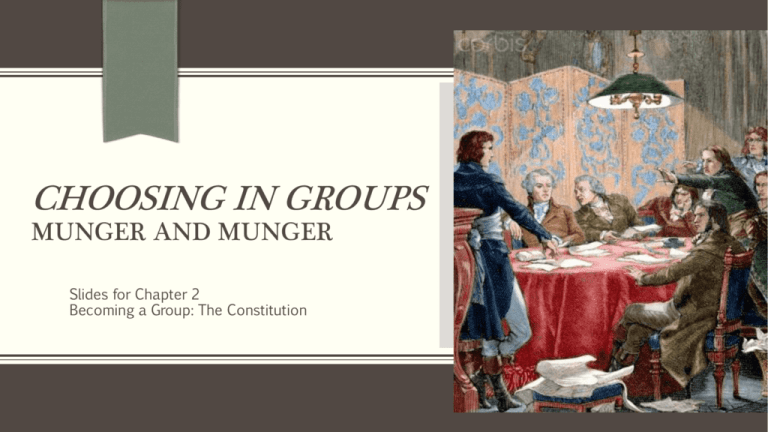
CHOOSING IN GROUPS
MUNGER AND MUNGER
Slides for Chapter 2
Becoming a Group: The Constitution
Outline of Chapter 2
Determining group preferences
Constituting collective choice
Constitutional moment
Constitutional design
The fundamental transformation
Agenda manipulation
Revelation manipulation
Constraining domain
Inherited disequilibrium
Analytical politics
Slides Produced by Jeremy Spater, Duke University.
All rights reserved.
2
Determining group preferences
Axiology: Knowledge of “the good”
“What is a good society?”
Ontology: Knowledge of “what is”
“What types of societies exist?”
Epistemology: Knowledge of “what can be known”
“How can we empirically assess the effects of policies?”
Slides Produced by Jeremy Spater, Duke University.
All rights reserved.
3
Determining group preferences (2)
Problem of collective choice
Older work treats group preference is a question of epistemology
“Given individual preferences, how can we know the group preference?”
This is problematic
What is the group’s preference when the members disagree?
Question should be treated ontologically, not epistemologically
Methodological individualism
Approach that grounds group behavior in individual preferences
Individuals might not agree with the directives of the group
Nonetheless, individuals give consent to be bound by group directives
Everyone agrees to obey the group, even when they disagree with individual decisions
Slides Produced by Jeremy Spater, Duke University.
All rights reserved.
4
Constituting collective choice
Group forms association through agreement or contract
Rules regarding:
How
How
How
How
to choose as a group
to become a member
to leave the group
to change the rules (amendment process)
Forming a group, whether state or private, is political
Slides Produced by Jeremy Spater, Duke University.
All rights reserved.
5
Constitutional moment
Constitutional moment: Buchanan and Tullock (’62)
Unanimous: no involuntary coercion of minority
Disinterested: Rawlesian “veil of ignorance”
Free and Bound
Individual is bound to group decisions
Agreement is meaningless without enforcement
Individual is still free
Voluntarily chose to join group for own benefit
Voluntary and involuntary coercion
Voluntary: ex post enforcement of contract we voluntarily agreed to
Involuntary: ex ante threats to force agreement to contract
Slides Produced by Jeremy Spater, Duke University.
All rights reserved.
6
Constitutional moment (2)
Impartiality (disinterest)
Rawls (‘71): “Veil of Ignorance”
Start from “original position”: unconstituted state
Agree ex ante without knowing consequences for you
Ensures fair outcome: won’t agree to terms that are unfair to anyone (because it might be you!)
Buchanan and Tulloch (‘62): Uncertainty
Uncertain ex ante about whether “winning” or “losing” on particular issues
Choose fair institutions to minimize risk
More dynamic conception than that of Rawls; coalitions changing over time
Impartiality confers legitimacy
If rules are chosen to benefit some at expense of others, they clearly are not fair
People will not willingly uphold illegitimate constitution
Slides Produced by Jeremy Spater, Duke University.
All rights reserved.
7
Aside on Impartiality: The “Unoriginal Position”
Rawls is rightly credited with developing the “original position” in a way that gave him analytical
purchase of the problem of justice as fairness. But there were important precursors.
Tomasi (2012), for example, calls Rawls’s use of the idea “the unoriginal position” and points to
a passage in Hayek that takes much the same logic and applies it to fairness in laws. But an
even earlier “original position” can be found in Montesquieu.
Every day one hears it said that it would be good if there were slaves among us. But, to judge
this, one must not examine whether they would be useful to the small, rich, and voluptuous part
of each nation; doubtless they would be useful to it; but, taking another point of view, I do not
believe that any one of those who make it up would want to draw lots to know who was to form
the part of the nation that would be free and the one that would be enslaved. Those who most
speak in favor of slavery would hold it the most in horror, and the poorest of men would
likewise find it horrible. Therefore, the cry for slavery is the cry of luxury and voluptuousness,
and not that of the love of public felicity. Who can doubt that each man, individually, would not
be quite content to be the master of the goods, the honor, and the life of others and that all his
passions would not be awakened at once at this idea? Do you want to know whether the
desires of each are legitimate in these things? Examine the desires of all. (Montesquieu, 1750 /
1989Ref401; Book XV, Chapter 9, p. 253; emphasis added).
Slides Produced by Jeremy Spater, Duke University.
All rights reserved.
8
Constitutional design
Five basic problems
The fundamental transformation
Agenda manipulation
Revelation manipulation
Constraining domain
Inherited disequilibrium
Slides Produced by Jeremy Spater, Duke University.
All rights reserved.
9
Constitutional problems: Fundamental transformation
Fundamental transformation of strategic situation
Before contract: pure competition
After contract: bilateral monopoly
Hold-up
Ex-post recontracting
Parties to agreement can fail to uphold it
Wronged party can seek redress, or leave agreement altogether
However, these options are often more costly than simply accepting transgression
Slides Produced by Jeremy Spater, Duke University.
All rights reserved.
10
Constitutional problems: Agenda setting
Voting rules can change outcome
Choosing a chair can mean choosing a dictator
Poorly chosen voting rules can cause constitutional collapse
Even the best rules are subject to manipulation
Best option may be the rules that people understand and trust
Slides Produced by Jeremy Spater, Duke University.
All rights reserved.
11
Constitutional problems: Revelation manipulation
Possible response to agenda manipulation
Vote strategically, rather than sincerely
Obtain desired outcome by lying about preferences
Limits power of agenda setter
Borda voting (ranking alternatives) is especially prone to this
Slides Produced by Jeremy Spater, Duke University.
All rights reserved.
12
Constitutional problems: Constraining domain
Circumscribe domain for collective choice
Protect minority from will of majority
Ex ante, provide general protections
Example: freedom of speech
Majority might try to silence minority
Ex ante, everyone has interest in making sure their own voice is not silenced
Slides Produced by Jeremy Spater, Duke University.
All rights reserved.
13
Constitutional problems: Inherited disequilibrium
Citizens push for institutions to achieve their desired ends
Conflict about ends leads to conflict about institutions
Outcome is subject to manipulation
Citizens’ beliefs about connection between means and ends may be confused or wrong
This confusion can be exploited by self-seeking politicians
Outcome is “unpredictable as poetry” (Riker ‘80)
Slides Produced by Jeremy Spater, Duke University.
All rights reserved.
14
Analytical politics
This book limits its focus to the problem of choosing in groups
This means starting in the middle
Group has already constituted itself
Ignores problem of group constitution
Sometimes groups don’t choose as groups
Groups can disband
Factions within group can fight for control
These situations are outside purview of this book
Slides Produced by Jeremy Spater, Duke University.
All rights reserved.
15







